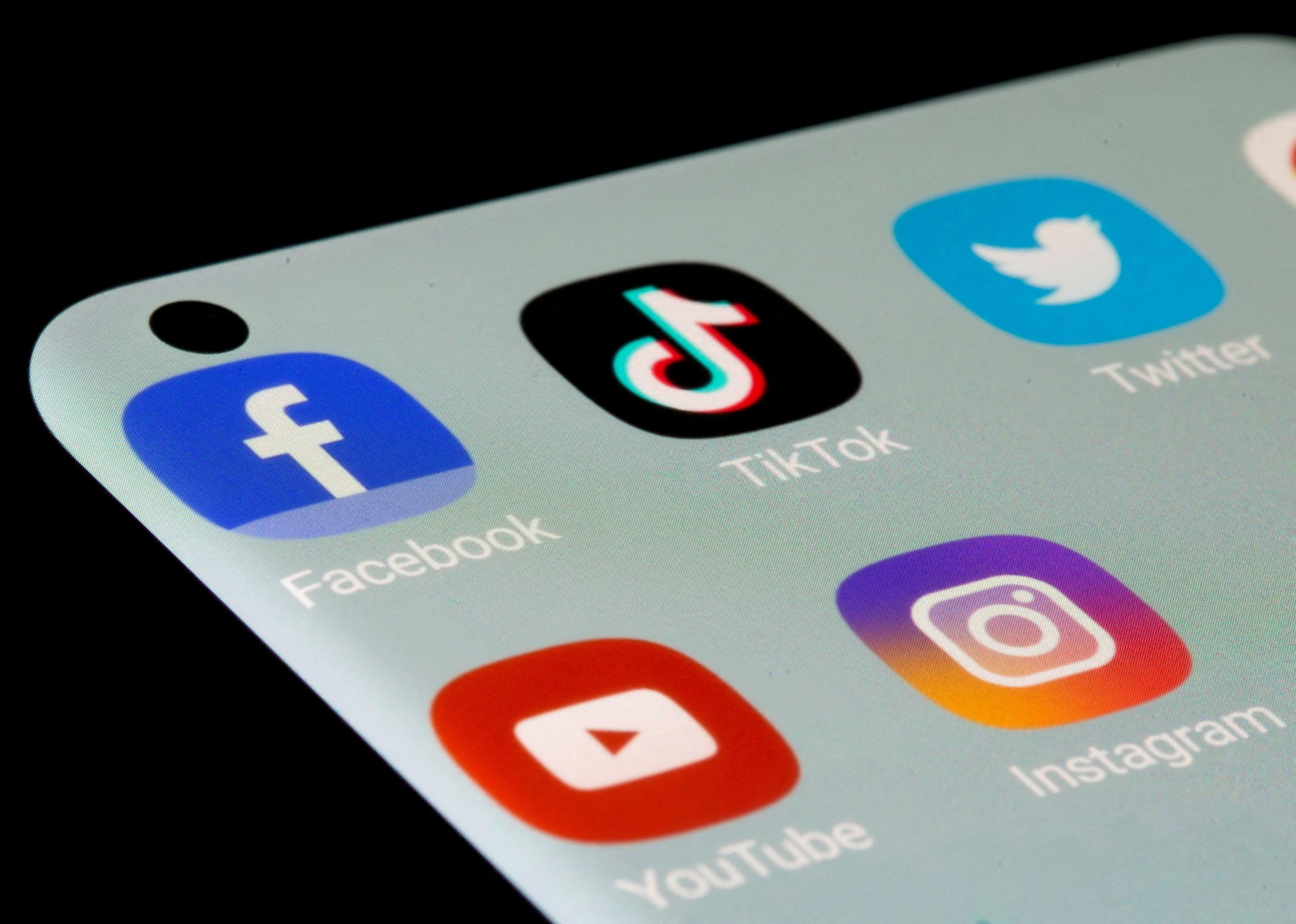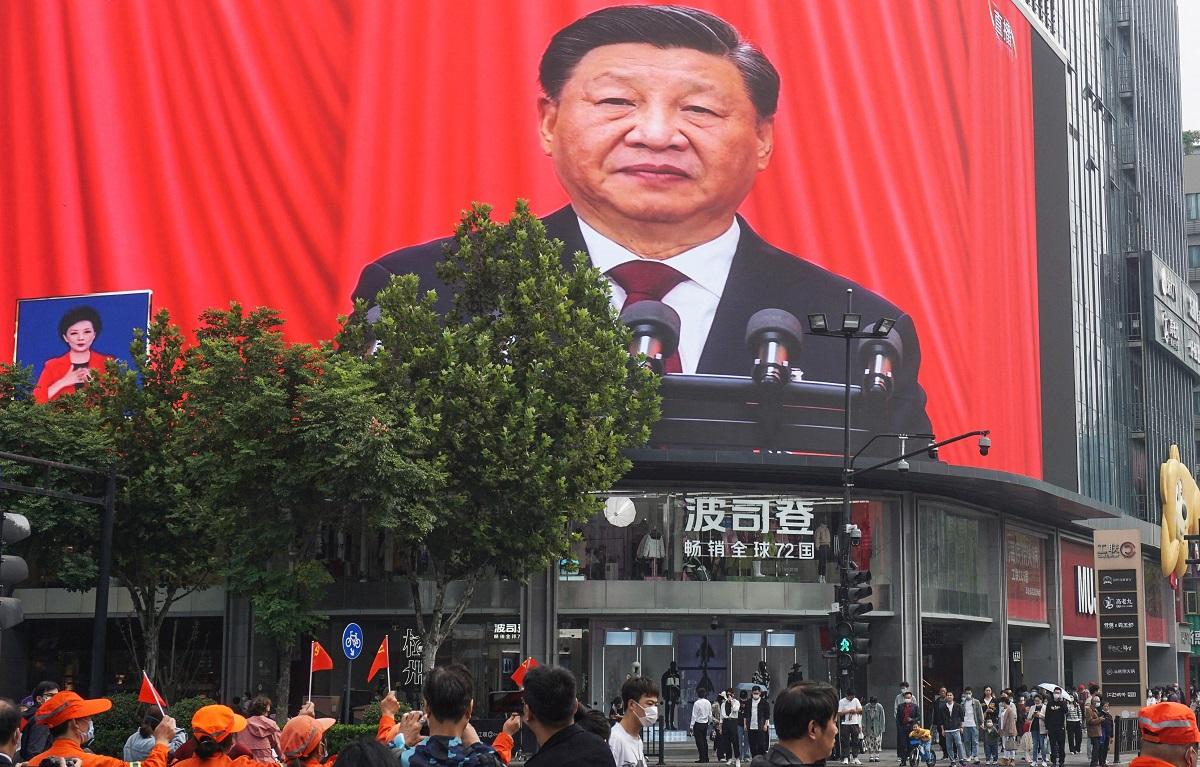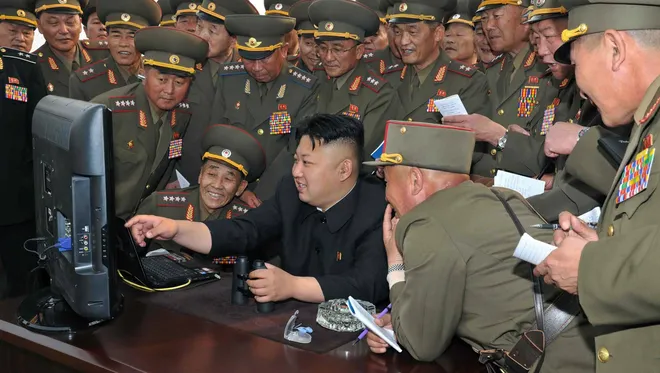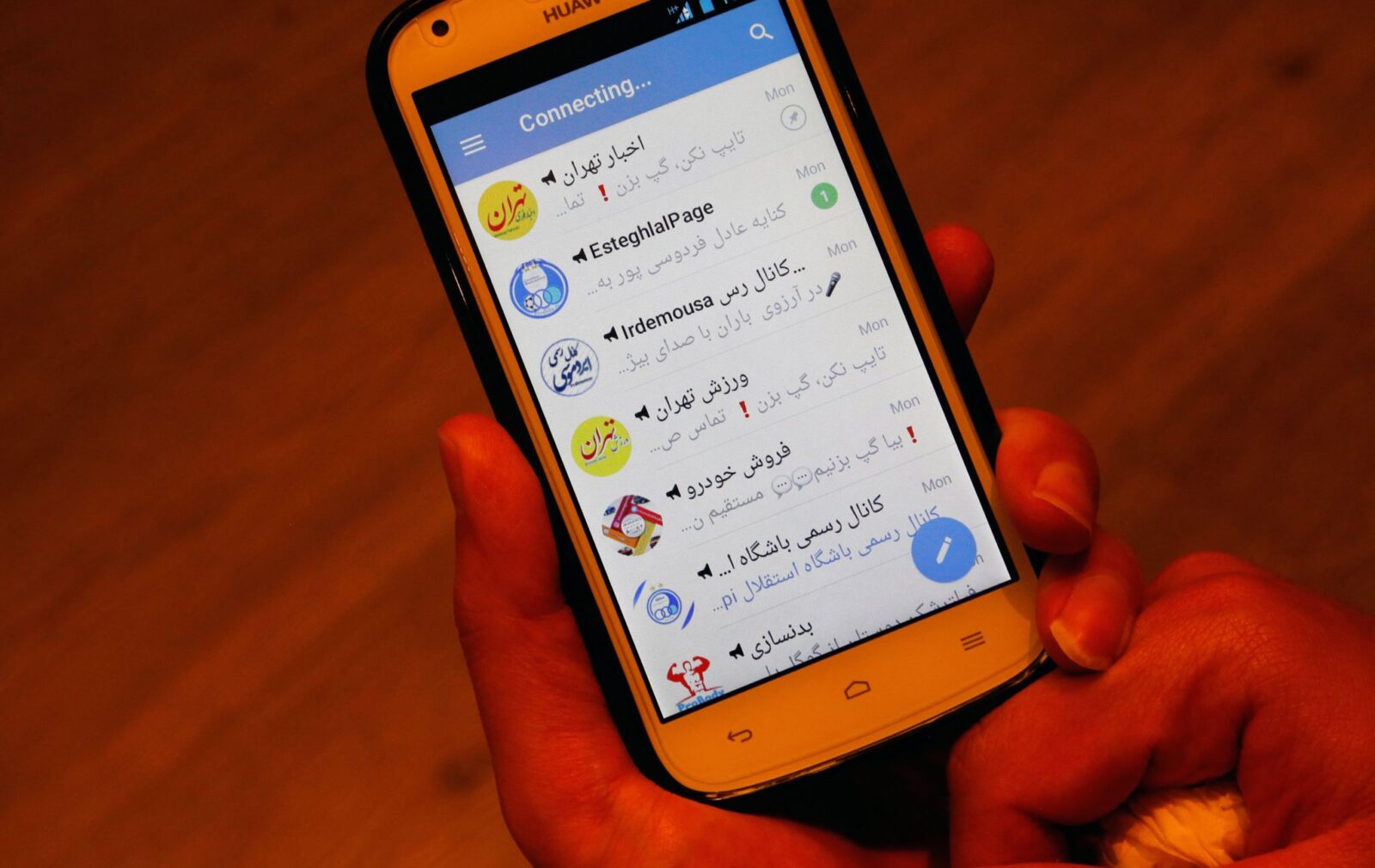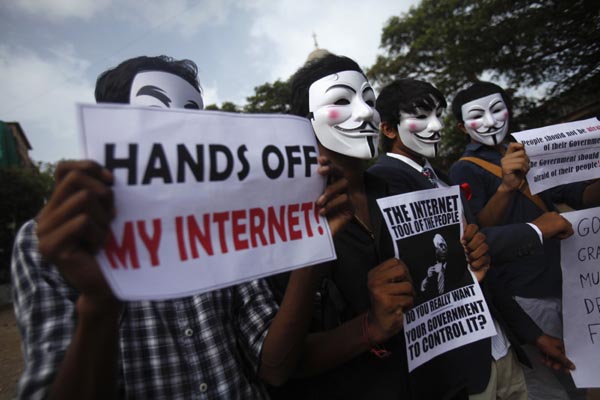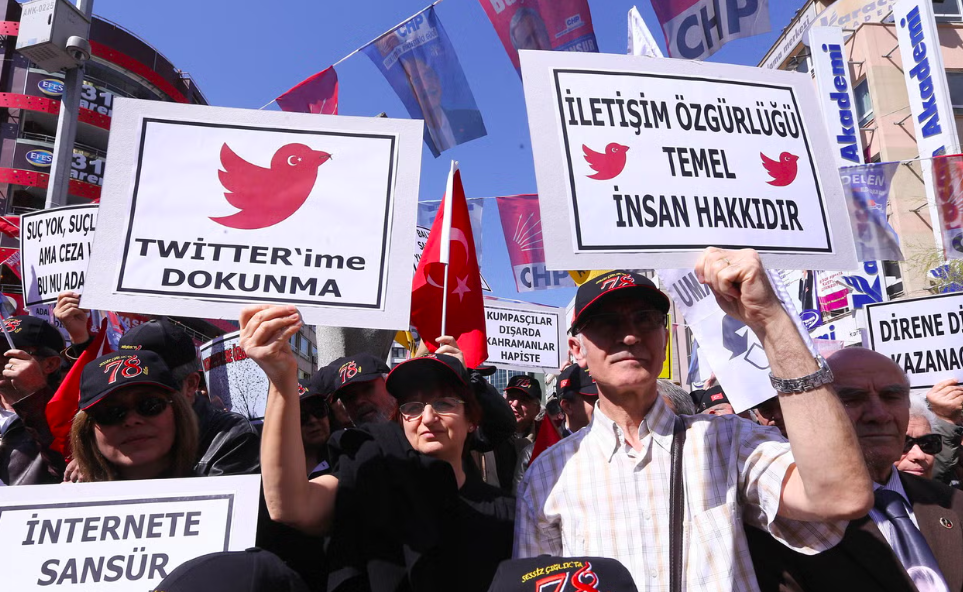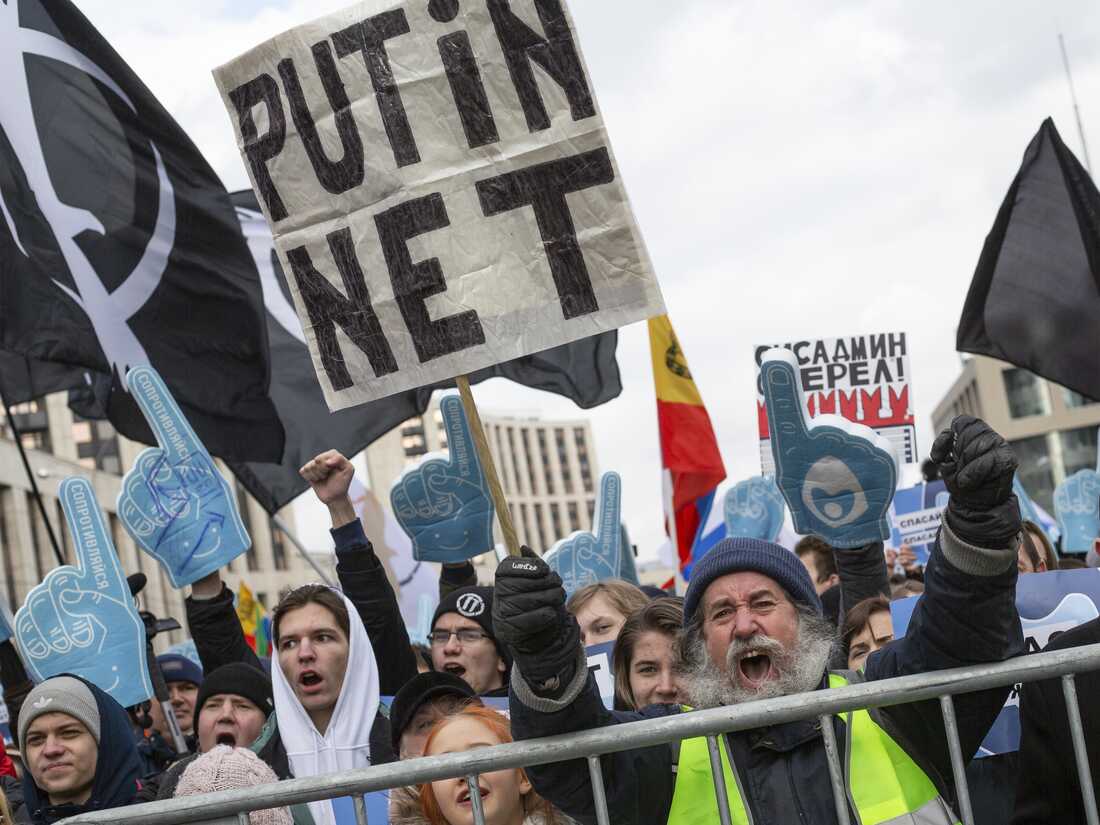Digital tug-of-war: Countries battle social media with bans, local alternatives in 2024
Facebook, TikTok, Twitter, YouTube and Instagram apps are seen on a smartphone in this illustration taken, July 13, 2021. (Photo via Getty Images)
August 04, 2024 11:45 PM GMT+03:00
Social media platforms are vital communication tools for over 4.6 billion people worldwide.
Yet, many countries have imposed restrictions or outright bans, impacting how citizens interact online.
According to Statista, at least 71 countries have blocked or restricted access to social media since 2015.
The motivations behind these actions vary, reflecting diverse approaches to digital control.
People watch an outdoor screen showing the live speech of Chinese President Xi Jinping during the opening session of the 20th Chinese Communist Party Congress in Hangzhou, in China’s eastern Zhejiang province on October 16, 2022. (AFP Photo)
China
- Blocked platforms: Facebook, Twitter, WhatsApp, Instagram, Snapchat, YouTube, Google services, TikTok and many others.
- Background: China has maintained a robust digital censorship regime since 2009, when it blocked major platforms like Facebook and Twitter following riots in Xinjiang. This action aimed to curtail activist communication and maintain social order. The Great Firewall of China remains a significant barrier, replacing Western platforms with domestic alternatives like WeChat, Douyin and Weibo, all of which are heavily monitored and regulated.
- Internet environment: The use of VPNs is prohibited, except for government-controlled ones, ensuring the state’s control over online activities. Although regions like Macau and Hong Kong have some degree of digital autonomy, China's national policies maintain strict oversight.
Government alternatives:
- WeChat (微信): Replaces WhatsApp and Facebook Messenger; a multi-functional app used for messaging, social media, and mobile payments, heavily monitored by the Chinese government.
- Weibo (微博): Similar to Twitter, allows users to post updates and engage in public discussions with government-regulated content.
- Douyin (抖音): China’s version of TikTok, subject to strict content controls to align with Chinese cultural norms.
North Korean leader Kim Jong-Un looking at a computer in undated file picture (North Korea's official Korean Central News Agency)
North Korea
- Blocked platforms: All Western social media platforms, including Facebook, Twitter, Instagram and YouTube.
- Background: Since officially blocking Facebook and Twitter in 2016, North Korea has severely restricted internet access, allowing only select individuals such as high-ranking officials and scientists to use it under stringent monitoring. Most citizens have no access to the internet at all.
- Government control: North Korea's media control extends beyond social media to encompass radio and television, reinforcing a tightly controlled information environment. The government-sanctioned intranet serves as a substitute, preventing citizens from accessing global content.
Government alternative:
- Kwangmyong (광명): A state-run intranet providing limited access to government-approved websites, online libraries and email service.
An Iranian user tries and fails to access Telegram after the government blocked the messaging app (EPA Photo)
Iran
- Blocked platforms: Facebook, Twitter, YouTube, TikTok, Twitch, Discord, Weibo, Snapchat, Telegram and over 5 million websites since 2009.
- Background: The 2009 Iranian Presidential Election protests led to the first social media bans. The government employs "smart filtering" to block content against Islamic and governmental standards, restricting access to sites like Facebook, YouTube and Twitter.
- National internet plans: Iran collaborates with China to establish a national internet similar to China’s, aiming for stringent control over online content. This includes blocking encrypted messaging platforms like Signal and restricting access to Instagram and WhatsApp during political unrest.
Government alternatives:
- Aparat (آپارات): Iran's primary video-sharing platform, similar to YouTube, with content monitored for compliance with cultural norms.
- Soroush: An alternative to WhatsApp and Telegram, offering messaging services with government oversight.
Protesters from the Anonymous India group of hackers wear Guy Fawkes masks as they protest against laws they say gives the government control over censorship of internet usage in Mumbai, June 9, 2012. (Reuters Photo)
India
- Blocked platforms: TikTok, WeChat, Baidu, UC Browser, Shareit, and 54 other Chinese apps since June 2020. Social media platforms like Facebook, Twitter and Instagram are under scrutiny.
- Background: TikTok and other apps were banned in June 2020 because of security concerns following border clashes with China. The Indian government has implemented new regulations that social media platforms must follow to avoid further bans, although platforms like Facebook, Twitter and Instagram are still operational under scrutiny.
Protesters hold placards reading 'do not touch my twitter' and 'communication right is a basic human right' during a demonstration in Ankara against the Turkish ban on Twitter (AFP Photo)
Türkiye
- Blocked platforms: Instagram as of August 2024; previously blocked platforms include Twitter, Facebook, YouTube, WhatsApp and Wikipedia.
- Background: Türkiye has a history of temporary social media bans, particularly during political turmoil or sensitive periods. The ongoing tension with platforms like Twitter since 2014, driven by allegations of corruption against the government, exemplifies Türkiye's proactive stance on regulating content. In August 2024, Instagram was blocked nationwide because Instagram restricted posts related to the death ofIsmail Haniyeh, leader of the Palestinian resistance movement Hamas, a high-profile incident.
- Government's stance: Officials demand fair treatment from platforms regarding content moderation. Instagram's ban will be lifted once compliance with national regulations is achieved.
Government alternative:
- YaaniMail: As an alternative to Yahoo Mail and Gmail, YaaniMail is a Turkish email service promoting local internet services, compliant with Turkish regulations.
Demonstrators shout during a Free Internet rally in Moscow, Russia, March 11, 2019 (AP Photo)
Russia
- Blocked platforms: Twitter, Facebook, Instagram, LinkedIn, Telegram, TikTok and over 13,000 websites since 2011.
- Background: Russia's censorship measures intensified during the Ukraine invasion in 2022, employing a "single register" to block content deemed extremist. This has affected numerous non-political websites as well.
- Iron Curtain: In collaboration with China, Russia has developed systems to isolate its internet from the global network, further limiting digital freedom.
Government alternative:
- VK (VKontakte): Russia's largest social networking site, similar to Facebook, under government control.
- Odnoklassniki (OK.ru): A social network for connecting friends and classmates, offering regulated services as an alternative to Facebook and LinkedIn.
- Yandex Zen (now Dzen.ru): A content discovery and blogging platform integrated with Yandex, as an alternative to Medium, Blogger. Provides personalized content recommendations using AI algorithms, operating under Russian media laws.
- Telegram (Limited Usage): Messaging app offering end-to-end encryption, channels, and bots. Created by Russian entrepreneur Pavel Durov, as an alternative to WhatsApp. Yet, it also faced regulatory challenges in Russia but remains popular for its privacy features.
- Rutube: Russia's main video-sharing platform, similar to YouTube. Allows users to upload and share videos across various categories, compiling with Russian content regulations.
- Sferum: A video conferencing platform used for virtual meetings and remote work, especially in education, created as an alternative to Zoom and Microsoft Teams.
Bangladesh
- Blocked Platforms: Instagram, Facebook, WhatsApp, Twitter, YouTube, TikTok and Snapchat as of August 2024.
- Background: Bangladesh has a history of imposing temporary bans on social media, particularly during politically sensitive times. The government has implemented a surveillance and filtering program similar to Iran's, focusing on online safety concerns. Instagram and other platforms were recently banned to maintain public order and control content deemed inappropriate.
Uganda
- Blocked platforms: Facebook and Instagram since 2021; platforms like Twitter, WhatsApp, and YouTube are under censorship during elections.
- Background: The 2018 social media tax aimed to curb online gossip, charging users to access apps like Facebook, Twitter, Instagram and WhatsApp. This move was widely criticized as a suppression of free speech. Facebook and Instagram remain blocked, particularly during election periods, as the government seeks to control online narratives.
Vietnam
- Blocked platforms: Periodic bans on Facebook, YouTube, LinkedIn, Instagram, and streaming services like Netflix, Hulu and HBO.
- Background: The "Bamboo Firewall" symbolizes Vietnam's control over online content, with periodic bans on social media to stifle criticism against the government. A national social media code encourages positive content about the state, and platforms like LinkedIn and Facebook have faced temporary bans.
Government alternative:
- Zalo: A Vietnamese messaging app similar to WhatsApp and Facebook Messenger, operating under Vietnam's legal framework.
Turkmenistan
- Blocked Platforms: Facebook, Instagram, Twitter, YouTube, Skype, WeChat, Telegram, and Russian networks such as VKontakte and Odnoklassniki since 2008.
- Background: Internet access is limited, with most citizens only able to use Turkmenet, a government-controlled intranet. State-owned TurkmenTelecom monopolizes the internet, ensuring strict content control. The country's digital environment is tightly monitored, with Western social media platforms completely blocked.
Government alternative:
- Turkmenet: A government-controlled intranet providing access to state-approved content.
Belarus
- Blocked Platforms: Facebook, Telegram, YouTube, Instagram and other social media channels during political unrest since 2006.
- Background: Belarus has a history of internet censorship dating back to 2006. The government requires website registration with the Information Ministry and enforces self-censorship among citizens. Access to major social media sites is sometimes limited, with many groups and channels deemed illegal.
Saudi Arabia
- Blocked platforms: No major platforms are completely blocked, but content is heavily censored, especially those against Islamic beliefs. Platforms like Twitter and Facebook are monitored, and certain content is restricted.
- Overview: Saudi Arabia restricts access to content conflicting with its religious and political views. While social media remains widely used, it is subject to governmental oversight.
Government alternative:
- Sada (صدى): Sada is a microblogging platform designed to serve as an alternative to Twitter, where users can share short updates and engage with content within a framework that aligns with Saudi cultural and religious standards.
Myanmar
- Blocked platforms: Facebook and other social media during political unrest.
- Overview: Myanmar enforces social media bans to control information during political instability and suppress dissent against the government.
Government alternative:
- MyChat: It is a messaging application developed to serve as an alternative to global messaging platforms, mainly WhatsApp. It is designed to comply with Myanmar's digital policies and provides features like chat, multimedia sharing, and group communication.
Syria
- Blocked platforms: Facebook, Twitter and other platforms related to political content.
- Overview: Syria restricts access to social media to maintain control over political narratives and limit the dissemination of information during the ongoing conflict.
Cuba
- Blocked platforms: Limited access to platforms like Facebook and Twitter, with heavy monitoring.
- Overview: Cuba imposes strict control over internet access, particularly during political events, to monitor and restrict dissent.
Government alternative:
- La Tendedera: As an alternative to Facebook, it allows users to connect with friends and share content, all within the constraints of Cuban internet policies.
Egypt
- Blocked platforms: Temporary bans on platforms like Facebook and Twitter during political protests.
- Overview: Egypt uses social media restrictions to manage political dissent and control the narrative during unrest.
Government alternative:
- Masrawy: It is an Egyptian news portal and social platform that offers content aligned with Egyptian regulations. It serves as an alternative for citizens seeking news and social interactions within a regulated framework.
August 04, 2024 11:45 PM GMT+03:00
